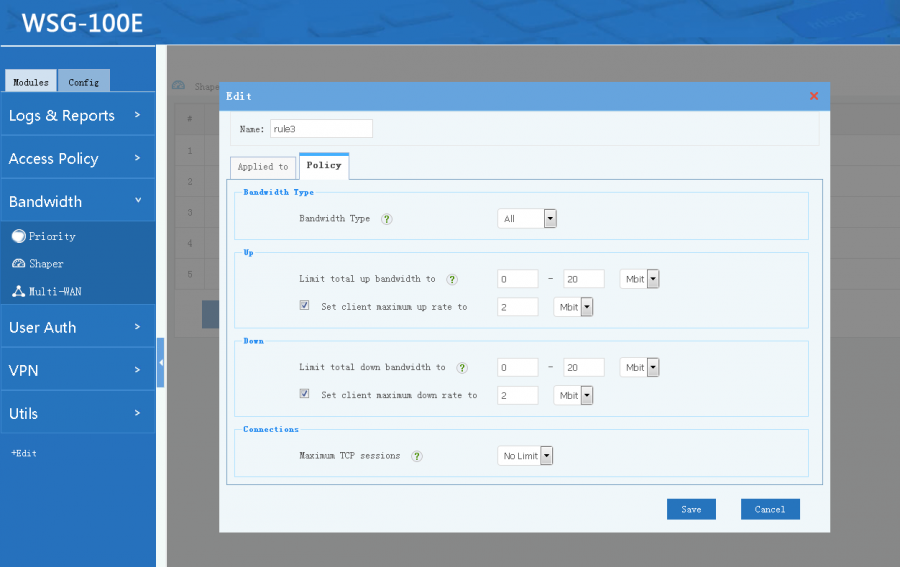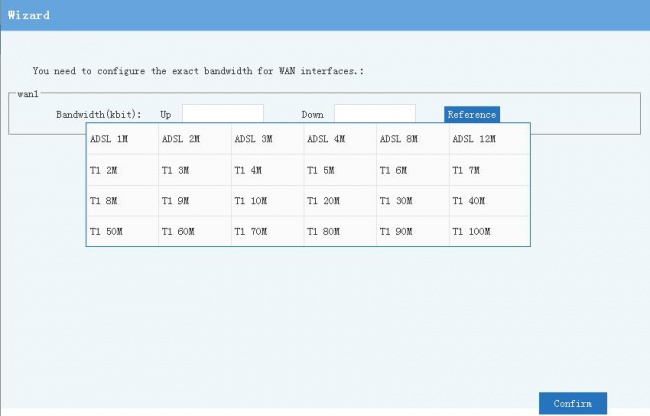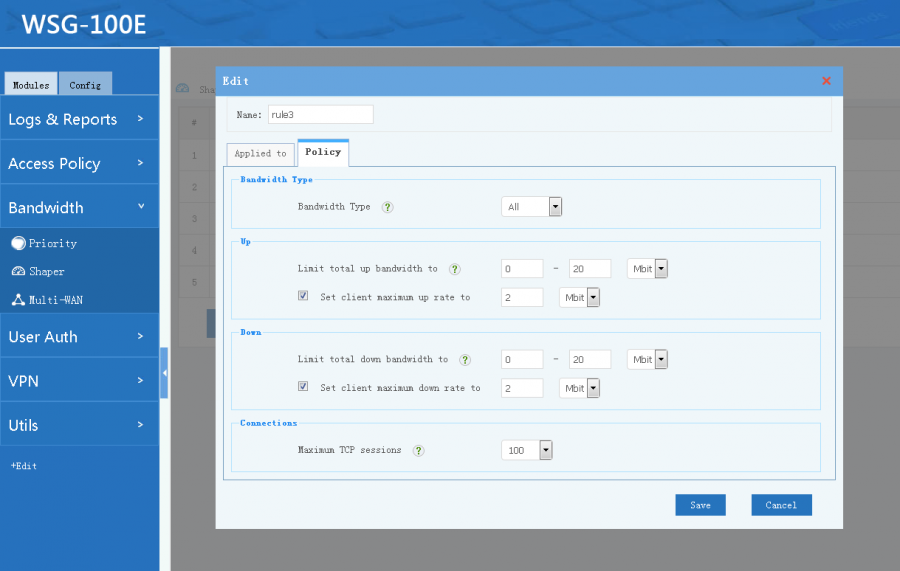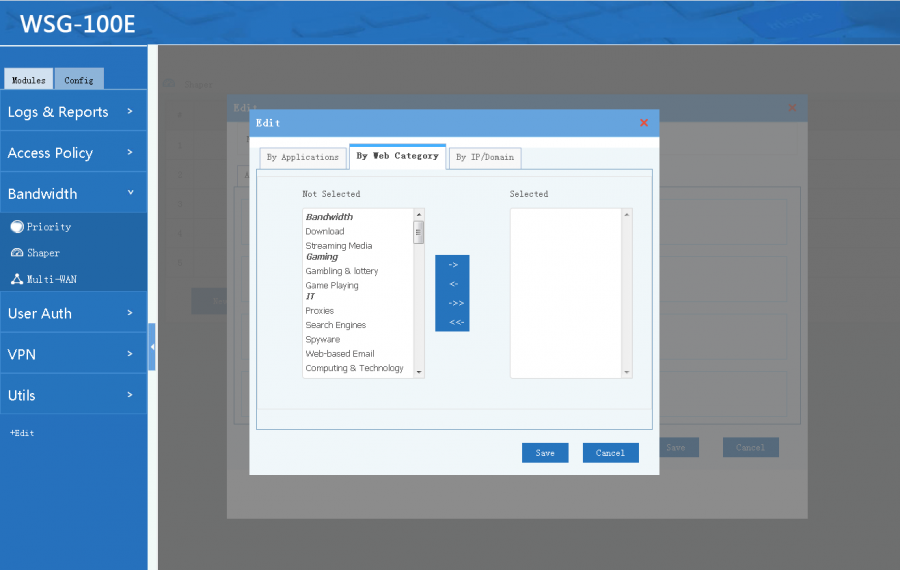Ipcontrol
(→Policy) |
|||
| (7 intermediate revisions by one user not shown) | |||
| Line 10: | Line 10: | ||
[[File:ros_ipcontrol_001.png|800px]] | [[File:ros_ipcontrol_001.png|800px]] | ||
| + | |||
| + | A typical example: | ||
| + | |||
| + | [[File:ros_ipcontrol_002.png|900px]] | ||
| + | |||
| + | In the above diagram, 20Mbit downloading bandwidth is allocated to the R&D department, and each client in the R&D department won't exceed 2Mbit downloading bandwidth. | ||
== WAN Bandwidth Settings == | == WAN Bandwidth Settings == | ||
| Line 22: | Line 28: | ||
Besides the applied to "clients" and "time", detailed "bandwidth shaper policy" settings are described in below. | Besides the applied to "clients" and "time", detailed "bandwidth shaper policy" settings are described in below. | ||
| − | * You can | + | * '''Bandwidth Type''': You can limit bandwith for all traffic, or a certain type of traffic based on "application type" or "website category". |
| − | * '''Minimum | + | * '''Minimum Bandwidth''': the minimum bandwidth defines the static allocated bandwidth. '''Notice''': sum of the minimum rate of all rules shall not exceeds the available internet bandwidth rate. |
| − | * '''Maximum | + | * '''Maximum Bandwidth''': the maximum bandwidth rate the clients can have. |
| − | * ''' | + | * '''Client Maximum Rate ''': The maximum bandwidth for each client in this rule. |
| − | * If sum of minimum rate exceeds available internet bandwidth, | + | * '''Maximum TCP sessions''': Maximum concurrent TCP connections per client. |
| − | [[File:Ipcontrol_set_en. | + | |
| + | * If sum of minimum rate exceeds available internet bandwidth, WFilter will not be able to ensure the minimum rate. | ||
| + | [[File:Ipcontrol_set_en.png|900px]] | ||
| + | |||
| + | [[File:Ipcontrol_set_en2.png|900px]] | ||
| − | Let's | + | Let's make an example. Suppose the total download rate is "20Mb"(2.5mbps), and there are three departments to share the internet. The solution is: |
| − | Suppose the total download rate is "20Mb"(2.5mbps), and there are three departments to share the internet. The solution is: | + | |
* Rule 1: Set download rate of "Depart A" to 1.25mbps(minimum)-2.5mbps(maximum). | * Rule 1: Set download rate of "Depart A" to 1.25mbps(minimum)-2.5mbps(maximum). | ||
* Rule 2: Set download rate of "Depart B" to 0.625mbps(minimum)-2.5mbps(maximum). | * Rule 2: Set download rate of "Depart B" to 0.625mbps(minimum)-2.5mbps(maximum). | ||
* Rule 3: Set download rate of "Depart C" to 0.625mbps(minimum)-1.25mbps(maximum). | * Rule 3: Set download rate of "Depart C" to 0.625mbps(minimum)-1.25mbps(maximum). | ||
The result: | The result: | ||
| − | * When | + | * When internet is not busy, "Depart A" and "Depart B" can get maxium downloading rate of 20Mb(2.5mbps). However, "Depart C" can only get maxium rate of 10Mb(1.25mbps). |
| − | * When | + | * When internet is busy, "Depart A" gets 10Mb(1.25mbps), while "Depart B" and "Depart C" can only get 5Mb(0.625mbps). |
| − | If you | + | * If you want to limit bandwidth of each client IP, you need to setup "client maximum rate". |
| − | + | ||
Latest revision as of 20:55, 9 July 2019
[edit] 1 Bandwidth Shaper
This module enables you to limit and shaper client's real-time bandwidth rate, including below features:
- Limit bandwidth rate based on IP, group and user account.
- Set time range for bandwidth shaper.
- Set maximum and minimum bandwidth rate for downloading and uploading.
- Ensure the minimum bandwidth rate for client devices.
Notice: Rules are always processed from the top of a list down, first match wins. You may drag the re-order icon to re-order rules.
A typical example:
In the above diagram, 20Mbit downloading bandwidth is allocated to the R&D department, and each client in the R&D department won't exceed 2Mbit downloading bandwidth.
[edit] 2 WAN Bandwidth Settings
Correct WAN interfaces bandwidth settings are essential for bandwidth shaper.
- The WAN bandwidth wizard will appear for first time access this module.
- If you have multiple WAN interfaces, bandwidth of every WAN interface shall be configured.
- The bandwidth unit is "kbit".
- You may click "Reference" to check a pre-defined common bandwidth list. If none fits your network, you need to set the bandwidth manually.
[edit] 3 Policy
Besides the applied to "clients" and "time", detailed "bandwidth shaper policy" settings are described in below.
- Bandwidth Type: You can limit bandwith for all traffic, or a certain type of traffic based on "application type" or "website category".
- Minimum Bandwidth: the minimum bandwidth defines the static allocated bandwidth. Notice: sum of the minimum rate of all rules shall not exceeds the available internet bandwidth rate.
- Maximum Bandwidth: the maximum bandwidth rate the clients can have.
- Client Maximum Rate : The maximum bandwidth for each client in this rule.
- Maximum TCP sessions: Maximum concurrent TCP connections per client.
- If sum of minimum rate exceeds available internet bandwidth, WFilter will not be able to ensure the minimum rate.
Let's make an example. Suppose the total download rate is "20Mb"(2.5mbps), and there are three departments to share the internet. The solution is:
- Rule 1: Set download rate of "Depart A" to 1.25mbps(minimum)-2.5mbps(maximum).
- Rule 2: Set download rate of "Depart B" to 0.625mbps(minimum)-2.5mbps(maximum).
- Rule 3: Set download rate of "Depart C" to 0.625mbps(minimum)-1.25mbps(maximum).
The result:
- When internet is not busy, "Depart A" and "Depart B" can get maxium downloading rate of 20Mb(2.5mbps). However, "Depart C" can only get maxium rate of 10Mb(1.25mbps).
- When internet is busy, "Depart A" gets 10Mb(1.25mbps), while "Depart B" and "Depart C" can only get 5Mb(0.625mbps).
- If you want to limit bandwidth of each client IP, you need to setup "client maximum rate".




